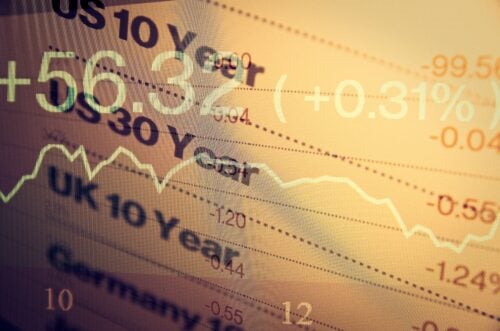Robinhood is a popular investing app that allows you to buy and sell stocks, ETFs, and options without paying any commission fees. But can you buy bonds on Robinhood? We’ve looked into it for you, and here’s what we found out.
Can You Buy Bonds on Robinhood?
Unfortunately, you cannot directly buy individual bonds on the Robinhood platform.
However, the platform offers bond ETFs (exchange-traded funds), which allow investors to invest in a basket of bonds indirectly.
Bonds and bond ETFs both offer a way for investors to earn income through fixed-interest payments. However, there are some key differences between the two investment options.
One major difference is in how they are bought and sold.

Individual bonds can be purchased directly from issuers or through a bond broker, and are held until maturity or sold at a profit (or loss) on the secondary market.
On the other hand, bond ETFs can be easily bought and sold like stocks on a stock exchange throughout the day.
Another difference is in diversification.
Buying individual bonds means putting all of your investment into one issuer, whereas bond ETFs provide instant diversification by holding a basket of bonds from multiple issuers.
Related: Robinhood Review: Is It the Best Free Trading App?
All About Bonds
A bond is a fixed-income investment in which an investor loans money to a government or corporation for a set period of time.
The borrower agrees to pay the lender periodic interest payments and return the loan’s principal amount at maturity.
The level of risk and potential return vary depending on the bond type and the borrower’s creditworthiness

Bond Categories
Investors can choose from a variety of bond options, including government bonds, municipal bonds, agency bonds, and corporate bonds.
- Government bonds – Also known as treasury bonds, these are a type of bond issued by the national government. They have a fixed interest rate and a fixed timeline for repayment, with longer terms than corporate bonds.
- Municipal bonds – These bonds are issued by states, cities, counties, and other governmental entities to finance operations and capital projects. They are exempt from federal income tax and may also be exempt from state and local taxes for residents of the issuing jurisdiction.
- Corporate bonds – Corporations issue these to raise funds for business operations and growth. Businesses choose to issue bonds rather than apply for bank loans for debt financing since bond markets provide better conditions and lower interest rates.
- Agency bonds – Government-sponsored enterprises (GSEs), such as Fannie Mae and Freddie Mac, issue these bonds. These GSEs use the funds from the bond sales to finance their operations and activities, which involve providing support for the housing market.
How Do Bonds Work?
When a company issues a bond, it essentially borrows from investors to raise funds for a specific project or expansion.
The bond includes details about the loan, such as the interest rate and the length of time before the company must pay back the loan (also known as the maturity date).
In exchange for loaning their money, the investor receives periodic interest payments until the maturity date, at which point they receive their initial investment (or principal) back.
Example Scenario:
Let’s say company ABC has $10 million in bonds outstanding, and they are due to mature in five years.
As the bond matures, company ABC must pay back the original bond amount of $10 million to the bondholders.
Meanwhile, company ABC needs to make regular interest payments to the bondholders during the five years based on the agreed-upon interest rate.
Let’s say the interest rate for company ABC’s bonds is 4%. This means that every year, company ABC needs to pay bondholders $400,000 in interest ($10 million x 4%).
At the end of the 5 years, not only does company ABC need to pay back the original bond amount of $10 million, but they also need to pay any remaining interest that has accumulated, which would amount to an additional $2 million ($10 million x 4% x 5 years).
Therefore, company ABC must pay bondholders $12 million ($10 million principal + $2 million interest) at maturity.

Where Can You Buy Bonds?
Bonds can be purchased directly from the issuing company or through various brokerages, such as TD Ameritrade and Fidelity.
These companies act as intermediaries, connecting buyers and sellers in the bond market.
The bond prices may vary between brokerages due to market fluctuations, and fees may be associated with purchasing and selling bonds.
The selection of available bonds may be limited compared to buying directly from the issuing company or government entity.
Additionally, bonds can also be bought and sold on the secondary market through exchanges like the New York Stock Exchange (NYSE) and the NASDAQ.
Are Bonds a Good Investment?
Yes, bonds can offer a steady stream of income and can also serve as a hedge against market volatility.
They have historically had lower default rates than stocks, making them a safer investment option.
However, it is important to consider the risks associated with bond investments, including credit and interest rate risks.
It is best to diversify your bond portfolio by investing in a mix of government and corporate bonds and bonds of different maturities to balance out risk in an investment portfolio.
Overall, bonds can be a valuable addition to any investment strategy.

Final Thoughts
If you’re looking to buy individual bonds, Robinhood is not the best place to do it. However, you can buy fractional shares of stocks and ETFs that include bonds in their portfolios.
There are several online brokerages that offer the ability to buy and sell bonds, so shop around and find one that meets your needs.
With a little research, you’ll be able to find an investment platform that allows you to invest in the securities you want.
You might also like:
The 7 Best Robinhood Stocks Under 2 Dollars To Buy Now
The 9 Best Robinhood Stocks Under 5 Dollars To Buy Now
Can You Short on Robinhood? Here’s How!
Robinhood Vs Webull: Which Investing App is Better?


 Tags:
Tags:










